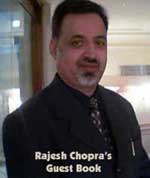 |
 |
| The Sunday Times November
19, 2006
Wounded Taliban treated in Pakistan Tim Albone, Quetta PAKISTAN is allowing Taliban fighters wounded in battles with British and other Nato forces in Afghanistan to be treated at safe houses. The Sunday Times found Taliban commanders and their fighters recuperating in the city of Quetta last week and moving freely around parts of the city. In a white-walled compound in the northern suburb of Pashtunabad, more than 30 Taliban were recovering from the bloodiest fighting in Afghanistan since their regime was ousted five years ago. Dressed in neatly pressed robes with the black turbans and kohl-rimmed eyes typical of the Taliban, they lounged on cushions, sipping green tea and sucking at boiled sweets while laughing at Nato reports that they have sustained heavy casualties. Among the most defiant was a young commander who had been shot in the calf last month while fighting British troops in Gereshk, a town in the Afghan province of Helmand, and who had returned to Quetta to be treated. “Fighting the British is as easy as eating a loaf of bread from my hand,” he said in a soft voice. “Fighting the British is much easier than the Americans. They have no faith.” The proof that Taliban are using Quetta for rest and recuperation — if not also for training as widely suspected — is embarrassing for President Pervez Musharraf, who is due to receive Tony Blair, the prime minister, today. Musharraf has long denied claims from the Afghan government that his military intelligence is providing support and safe havens for the Taliban. He was outraged when Hamid Karzai, the Afghan president, went to Islamabad, the Pakistan capital, last February and presented him with a list of names, addresses and telephone numbers in Quetta of Taliban leaders, including Mullah Omar, the head of the movement. Dismissing this as “nonsense”, Musharraf accused Karzai of being “totally oblivious of what is happening in his own country”. In New York in September he told the Council on Foreign Relations that Omar had not been in Pakistan since 1995 and was holed up in the Afghan city of Kandahar. “They (the Afghans) have taken a very, very easy course: the scapegoating of Pakistan,” he again insisted in a television interview last week. Drawn by the British, the border between Pakistan and Afghanistan is more than 1,400 miles of largely mountainous terrain that is hard to monitor, largely lying in lawless tribal areas. These border areas were used as bases by the mujaheddin in their fight against the Russian occupation of Afghanistan in the 1980s, and many of the camps and ammunition stores remain. But there is growing unease in both Washington and Whitehall about how much of the problem is logistical and whose side Pakistan is on. Not a single known Taliban has been arrested in Pakistan apart from a spokesman, Latifullah Hakimi. That came only after British intelligence intercepted his telephone call from Peshawar ordering the execution of a British engineer. British and American military commanders in Afghanistan are fed up with their men being killed by fighters who slip back across the border where they cannot be followed. General David Richards, the British commander of Nato forces in Afghanistan, flew to Islamabad last month to raise the issue with Musharraf, though he insisted his aim was “co-operation, not confrontation”. The Foreign Office confirmed that concerns about Pakistan’s position were among the main reasons for Blair’s trip to Islamabad — his third since the September 11 attacks turned Musharraf from a pariah into a key ally. “We fully understand the tightrope that General Musharraf is walking between extremists and helping the West,” a spokesman said. “We know he is fighting a number of insurgencies within his own borders. But he too has said he is concerned about growing Talibanisation in his own country and our message is we want to help.” The official expressed frustration at the failure of the Afghan government to produce concrete evidence of Pakistan’s alleged training of the Taliban. “They constantly tell us of videos but we never actually get them.” Musharraf’s insistence that his country is not a safe haven was undermined, however, by what The Sunday Times saw in an area to which journalists are often denied access. |
 |
 |
 |
|
LiveIndia.Com Copyright
© 1998-2001 Live India Internet Services! All rights reserved
|